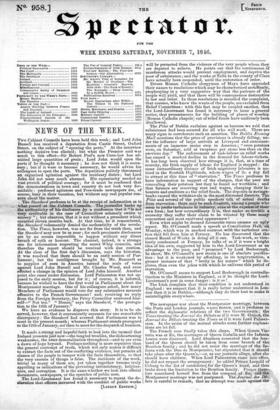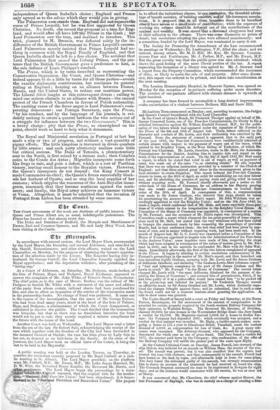The newspaper war about the Montpensier marriage, between the Paris
and London journals, waxes fiercer, and it professes to reflect the diplomatic relations of the two Governments ; the Times treating the Journal des Debuts as if it were M. Guizot, the Journal des Debuts treating the Times as if it were Lord Palmer- ston. In the midst of the mutual attacks some further explana- tions are let fall.
The French case finally takes this shape. When Queen Vic- toria was at Eu, the marriages of Queen Isabella and the Infanta Louisa were discussed. Lord Aberdeen consented that the hus- band of the Queen should be taken from some branch of the Bourbon family ; and he did not resist the marriage of the In- fanta with the Due de Montpensier, but stipulated that it should take place after the Queen's —or, as our journals allege, after she should have children. When Lord Palmerston came into office, he did not respect the arrangement : he added Prince Leopold of Coburg to the list of candidates] for the Queen's hand, and thus broke down the limitation to the Bourbon family. France there- fore considered herself free from the compact of Eu, and the Montpensier marriage was not postponed. The Journal des De- bats is careful to remark, that no attempt was made against the independence of Queen Isabella's choice ; England and France only agreed as to the advice which they wouldjoin in ,giving. The 'Palmerston case stands thus. England:did not espouse the cause of Prince Leopold; but he was first suggested by Queen Christina. No doubt, she meant the proposal: as a trap for Eng- land, and would after all have lefrthe 'Prince in the lurch ; but' Lord Palmerston saw the trap, and declined to interfere. This trick, planned by M. Bresson, was defeated solely by the in- difference of the British Government to Prince Leopold's success. Lord Palmerston merely insisted that Prince Leopold had no- thing in common with the Royal Family of England, and that Queen Isabella should be left to a free choice. The accident that Lord. Palmerston first named the Coburg Prince, and the pre- tence that the British Government gave a preference to him, is the sole defence of Louis Philippe's conduct. The Presse, which is by turns described as representing the Conservative Opposition, the Court, and Queen Christina—and indeed appears to do a little by turns for all those parties—avoids the exacter diplomatic controversies, but continues its general railing at England ; harping on an alliance between France, Russia, and the United States, to reduce our maritime power. The Liberal Sickle laughs at this extravagant dream ; calling to mind one serious obstacle to an alliance with Russia—the annual protest of the French Chambers in favour of Polish nationality. The exciting cause of the fierce anger is Lord: Pahnerston's exas- perating demeanour : our Foreign Secretary, says the Prase, "by his conduct, and by the language of his journals, is evi- dently seeking to create a quarrel between the two nations out of a struggle for influence between the two Governments." This is a: heavy charge: pity that the Presse, so clearsighted on the point, should work so hard to help what it denounces.



























 Previous page
Previous page